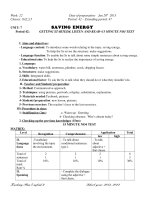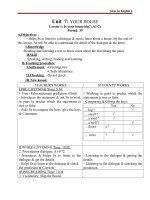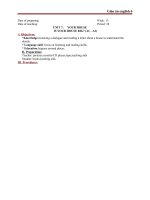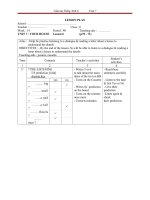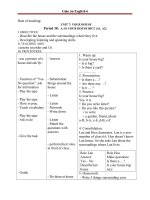Giáo án Tiếng Anh 9 unit 7: Saving energy
Bạn đang xem bản rút gọn của tài liệu. Xem và tải ngay bản đầy đủ của tài liệu tại đây (150.23 KB, 15 trang )
GIÁO ÁN TIẾNG ANH LỚP 9.
Period 42
Unit 7: SAVING ENERGY
GETTING STARTED & LISTEN AND READ
I. Objectives
-
By the end of the lesson, students will be able to use the words and phrases relating to energy – saving.
Understand the dialogue and the ways to save energy.
II. Language contents:
Vocabulary: water bill, enormous, crack, pipe, dripping faucet
Language skills: Practice Listing and reading skill.
III. Teaching aids
Teaching plan, cassette, textbook, sub-board, poster
IV. Procedure
1. Checking up:
Write 5 sentences, using conditional sentence type 1
2. New lesson
Teacher & Ss’s activities
Content
1. Warm up
- Talk about the name of energy
- Talk about the name of energy
+ water, wind, oil, wood, sun, nuclear, …
- Answer the questions
- How do we can save that energy?
2. Presentation
* Getting started
T: Ask Ss to loot at picture in part 1 "Getting started" have
them work in pairs and make a list of thing the family could
do to save energy.
Suggested answers:
T: Call on some Ss to read the list aloud
- Save water by turning off the faucet when there is
enough water supply
- Turn off the lights when unnecessary
- Turn off TV and radio when nobody watches or
listens
T: Give suggested answers
T: Introduce the new words
*Check Vocab: R & R
Ss: May use sentences with modal verbs such as
"must, should"
1. New words:
Water bill:
Enormous (a):
Crack(v):
T: Play the tape once
T: Divide class into group 4
T: Give group a piece of consisting columns: A (new words)
and B (Vietnamese meanings)
T: Ask Ss to match the words in A with the meaning in B.
T: Call on Ss to read the answers
- Give answers
Pipe (n):
Plumber (n):
Dripping faucet (n):
2. Matching
New words
Meaning
1. water bill
a.
2. enormous
b. hóa đơn tiền nước
3. crack
c.
4. pipe
d. to, lớn
5. plumber
e. ống nước
6.dripping faucet
f. vết nứt, gãy
3. T/F statements
3. Practice
T: Set the scene " Mrs. Mi is talking to her neighbor, Mrs. Ha
about the water bill this month"
• Answers:
1. True
T: Ask Ss to practice the dialogue with a partner
2. True
- Call on some pairs to practice aloud
3. False (Mrs. Ha hasn't check the pipes yet)
- Feedback on Ss' pronunciation and intonation. Correct the
mistakes if any.
4. False (Mrs. Ha suggest taking showers)
T: Ask Ss to read the dialogue again and decide the statements
in the book true of false. Correct the false one.
Ss: Compare the answers with a friend
T: Call some Ss to read the answers
T: Ask them to explain their choice.
4. Drill
T: Call on some Ss to translate the dialogue into Vietnamese
T: Help Ss to revise the new vocabulary
5. Homework
- Review the lesson, copy the answers
- Prepare "speak"
5. True
Period 43
Unit 7: SAVING ENERGY
SPEAK + LF3
I. Objectives
- By the end of the lesson, students will be able to:
+ Use suggestions to suggest ways to save energy through group discussion
II.Language contents:
Vocabulary: solar, nuclear power, solar panel, advance
Grammar: Making suggestions
Language skills: Practice speaking and listening skill.
III. Teaching aids
Teaching plan, textbook, sub-board, poster, tap, cassettes
IV. Procedure
1. Checking up:
Ss: Make a list of things the family could do to save energy.
2. New lesson
Teacher & Ss’s activities
Content
1. Warm up
+ awter llbi = Water bill
- Guides Sts to play the game “Jumble words” with
the words
+ suomrone = Enormous
- Play the game follow the teacher’s guide
Example:
+ kcrac = Crack
+ ippe = Pipe
+ rebmulp = Plumber
+ facetu = faucet
2. Presentation
-T: Help Ss to review the way to make suggestions
1. Model Sentences
T: Ask Ss to make some sentences with the
structures above.
A. I think we should turn off the faucet
- Look at the expressions in the tables and pictures.
Make suggestions about how to save energy.
I suggest fixing the faucet
2. Grammar
Suggestion
Response
I suggest + V-ing
OK
3. Practice
I think we should…
That's a good idea
T: Have Ss looked at the expressions in the above
tables and pictures in the book to make suggestions
about how to save energy. Follow the example
Shall we …?
All right
Why don't we…?
No. I don't want to.
How about + V-ing…?
I prefer to …
What about + V-ing…?
Let's...
T: Call some Ss to read the suggestions
aloud.
Ss: Individual work
T: Correct and give suggested answers
Let's…
3. Practice
a.
• Suggested answers:
b. I think we should turn off the gas fire
c. I suggest turning off the fan
d. I think we should turn off the air conditioner when no one is
in.
e. Why don't we turn off the TV when no one watches it.
f. I think we shouldn't go to school by motorbike.
g. Let's go to school by bus or bicycle.
b. Answers:
A: I think we should turn off all the lights before leaving the
class.
B: That is a good idea
4. further practice
T: Ask Ss to work in group of four. Work out an
C: What about going to school by bus?
ACTION PLAN to save energy for your class.
D: Great! Let's take the bus to school every day.
T: Explain the example in the book
---------
T: Go around class and provide help if necessary
A: I suggest collecting used paper to recycle things.
Ss: Work in group
B: All right.
T: Call on some groups act out the discussion.
C: Why don't we reduce the amount of water we use every day?
- Correct and give suggested answers
D: OK
-Making sentences, get ready to give the answers to
the whole class.
4. further practice
*Language Focus 3 (p.64)
Have Ss work in pairs.
-Get them to make suggestions from the
phrases provided.
- Go around and give help.
- Call on Ss to give the answers.
Making suggestions:
+ …suggest(s) Doing S.th
+ …suggest(s) that + S + should
/ shouldn’t Do S.th.
- Give feedback and correct answers.
*Language Focus 3
* Examples:
1. I suggest collecting some
Money.
2. I suggest giving lessons to
poor children.
3. I suggest that you should
work harder on your
pronunciation.
……………
8. Drill
- Repeat the content of the lesson
9. Homework
- Review the lesson, make sentences with these structures above
- Prepare "Listen + LF12
Period 44
Unit 7: SAVING ENERGY
LISTEN + LF1,2
I. Objectives
- By the end of the lesson, students will be able to:
+ Understand and know how to do 2 common listening tasks: TRUE or FALSE and gap filling.
+ Get general knowledge about one kind of alternative energy: solar energy.
+Students will be able to further improve their understanding about common connectives, phrasal verbs
II. Language contents:
Vocabulary: solar, nuclear power, solar panel, advance
Language skills: Practice speaking and listening skill.
Grammar:Connectives: and, but, because, or, so, therefore, however
phrasal verbs: turn off, turn on, look for, look after, go on
III. Teaching aids
Teaching plan, textbook, sub-board, poster, tap, cassettes
IV. Procedure
1. Checking up:
Ss: Make a list of things the family could do to save energy.
2. New lesson
Teacher’s activities
1. Warm up
Chatting:
T: Give some questions to ask Ss about solar energy.
- What is solar energy?
Students’ activities
- What are advantages of solar energy?
- Is solar energy operated in VN?
2. Pre – listening
-T: Explain some newwords
-Check Vocab: R & R
1. New words
-Solar (a):
-Solar energy (n):
-Nuclear power (n):
-Solar panel (n):
-True/False prediction
- Ss guess T or F
3. While – listening
Ss: Ss: Listen to the tape 3 times and check their predictions.
T: Call on Ss to give answers
T: Give correct answers
T: Ask Ss to read the sentences in b) and guess the missing
words
T: Call on some Ss to read the completed sentences aloud
T: Give correct answers
Ss: Look at the sentences, listen to the tape again and
complete them.
-Advance (a):
-Roof (n):
2. True/False prediction
Answer key:
1. true
2. false (most of our electricity comes from the use
of coal, gas, oil or nuclear power.
3. False (it is enough to provide power for total
population
4. true
5. false (in 2015)
3. Filling
Ss: Compare the answers with partners
Answers:
4. Post – Listening
1. effective
2. pollution
* Presentation 1:
3. countries
4. store
T: Explain function of the connectives
5. roof
6. instead
T: Ask Ss to give some examples to demonstrate the use of
the connectives
5. Grammar
* Practice1.
a.Connectives.
- And: to add a similar or another idea.
T: Tell Ss to do exercise 1. Complete the
- But, however: to add an opposite idea.
sentences use the correct connectives.
- Because: to give a cause (reason)
T: Ask Ss to compare the answers with a friend
- So, therefore: to give an effect
T: Feedback and gives correct answers
- Or: to give an alternative
*Presentation 2
* Answers:
T: Implicit the meanings of the phrases verbs through
examples "Now, can you guess the meaning of those of
phrasal verbs in the following context?"
a. and
b. but
c. because
d. therefore
e. or
f. so
+ It is dark here. Can you turn on the light?
g. and
h. however
+ Please. Turn off TV when you finish watching.
b. Phrasal verbs
+ It's important to look for a job after graduation.
+ My sister looks after the pet when I am away
+ She goes on taking about himself.
* Practice 2
T: Have Ss do exercise 2. complete the sentences use the
right tense form of the phrasal verbs in the box and the
pictures
T: Have Ss compare their answers with a friend
T: Correct any necessary mistakes
T: Give the correct answers
8. Drill
- Repeat the content of the lesson
9. Homework
- Review the lesson, make sentences with these structures above
- Prepare "READ
- Turn on: switch on/start
- Turn off: switch off/stop
- Look for: take care of
- Go on: continue
* Complete the sentences. Use the right tense form
of the phrasal verbs in the box and the pictures
*Answers
a.
b.
c.
d.
e.
Look after
Go on
Turn on
Looked for
Turn off
Period 45
Unit 7: SAVING ENERGY
READ
I. Objectives
By the end of the lesson, students will be able to get general idea of the reading through choosing the best summary
and answering questions
II. Language contents:
Vocabulary:
luxury, necessity, consumer, household,
Account for, tumble dryer, innovation
Language skills: Practice speaking and listening skill.
III. Teaching aids
textbook, white board markers
IV. Procedure
1. Checking up:
T: Asks Ss to talk about how to save energy in their house
2. New lesson
Teacher’s activities
Students’ activities
1. Warm up
- Guides Sts to play the game “net words”
- Play the game follow the teacher’s guide
Water
energy
1.New words
-Luxury (n): >< necessity
-Consumer (n):
2. Pre – reading
-Household (n):
T: Read the text firstly
-Account for (v):
T: Explain the new words
-Tumble drûe (n):
Ss: write down new words
- Innovation (n):
2. Pre questions
+ Which continents are mentioned in the text?
T: Ask Ss to work in pairs and make sentences with new
words they have learnt
T: Call on some Ss read their sentences aloud.
T: Give comment to make sure Ss understand the use of the
words.
+ Are electricity, gas and water luxuries or necessities?
* Answer
+ America and Europe
+ They are necessities
3. While – reading
T: Ask Ss to read the passage very quickly and check their
prediction.
3. The best summary
T: Call on some Ss to answer the questions
Answers:
T: Give the correct answers
3. North American and European countries are
interested in saving money and natural resources.
T: Have Ss read the passage more carefully and choose the
best summary for it among 4 following options
4. Comprehension questions
Answers:
T: Ask Ss to give explanations for their choice.
- Give correct answers
- Tell Ss to read the passage again and answer the question
T: Call on some Ss to read their answers aloud in front of
class.
- Make necessary corrections and gives correct answers.
1. Western consumers are interested in products that
will not only work effectively but also save money.
2. We can use energy saving bulbs instead of ordinary
100 watt light bulbs to spend less on lighting
3. She will pay US$2 for lighting if she uses energy
saving bulbs instead.
4. The purpose of the labeling scheme is to help
consumers to know how efficient each model is,
compared with other appliances in the same category so
that they can save money and energy.
5. Discussion
Why should we save energy?
* Suggested answers:
- Save money
- Conserve the Earth's resources
- Protect environment
4. Post – reading
- Prevent natural disasters
- Expand the topic by opening a discussion on question:
….
T: Ask Ss to work in group to list the reasons for saving
energy.
T: Call on representative of some groups to present in front
of class.
- Give suggested answers:
5. Drill
- Asks Sts to read again, repeat some words and model of sentences
6. Homework
- Review the lesson
- Assign homework
- Prepare the next part "WRITE"
Period 46
Unit 7: SAVING ENERGY
WRITE
I. Objectives
By the end of the lesson, students will be able to write a short, simple speech with clear organization and present it in
from of the whole class.
1. Language focus:
Vocabulary: Review
2. Language skills: Practice writing skill
II. Teaching aids
textbook, white board markers
III. Procedure
1. Checking up:
Answer the question: Why should we save energy?
2 New lesson
Teacher’s activities
Students’ activities
1. Warm up
- Introduces the way to write a speech
6. Write
2. Presentation
* Definition of a speech
T: Implicit the function of the parts a speech by questioning
It is the act of delivering a formal spoken
communication to an audience. A speech usually has
three parts: Introduction, body and conclusion
What do we do in introduction?
What is included in body?
* Matching
……
A
B
Parts of speech
Functions
1. Introduction
A. summing up what you
have said
B. getting people's attention
and telling them what you
are going to talk about.
2. Body
C. giving details in easy-tounderstand language.
3. Conclusion
* Answers:
1.b
2.c
3.a
b) Ordering
T: Give correct answers
Suggested answers:
3. Practice
3. Good evening, ladies and gentleman. I am professor
Robert and tonight I am going to tell you how to save
money.
T: Ask Ss to work in pairs, put the sections in the correct
place to complete a speech.
2. Most of us use too much gas. You can reduce this
amount by:
- Call on some Ss to deliver the speech in front of class.
- Traveling by bicycle or public transport.
- Comment and correct any necessary mistakes.
- Having mechanic check your motorcycle regularly.
T: Give suggested answer:
1. If you follow these simple rules, not only will you
save money, but also the environment will be clear.
T: Tell Ss to choose one of the topics in the book: reducing
garbage, reusing paper and saving energy in the kitchen and
then prepare a speech for the class.
T: Ask Ss to compare the writing with a friend.
T: Introduce "peer correction" Have Ss check and comment
on each other writing
* Suggested answers:
- Go around class and offer help if necessary
- Reducing garbage:
- Call on some Ss to deliver the speech they have written in
front of class.
Good morning, ladies and gentlemen. Thank you for
coming here today. I am professor Hung. President of
friends of the Earth. I am going to tell you about the
ways of reducing garbage.
T: Give comment on S's performance regarding
pronunciation, body language, eye contact …
As we know that reducing garbage is necessary. We can
reduce garbage by:
+ Collecting plastic bags
+ Not keeping solid waste with food waste.
Putting different kinds of waste in different places.
I hope that you will be able to find the most suitable way
to reduce the amount of garbage we produce.
- Give suggested answers
- Reusing paper:
….
- Saving energy in the kitchen
…
4. Drill
T: Summarize the main points
5. Homework
- Copy your writing in your exercise book
- Review the lesson
- Prepare " Language focus"

